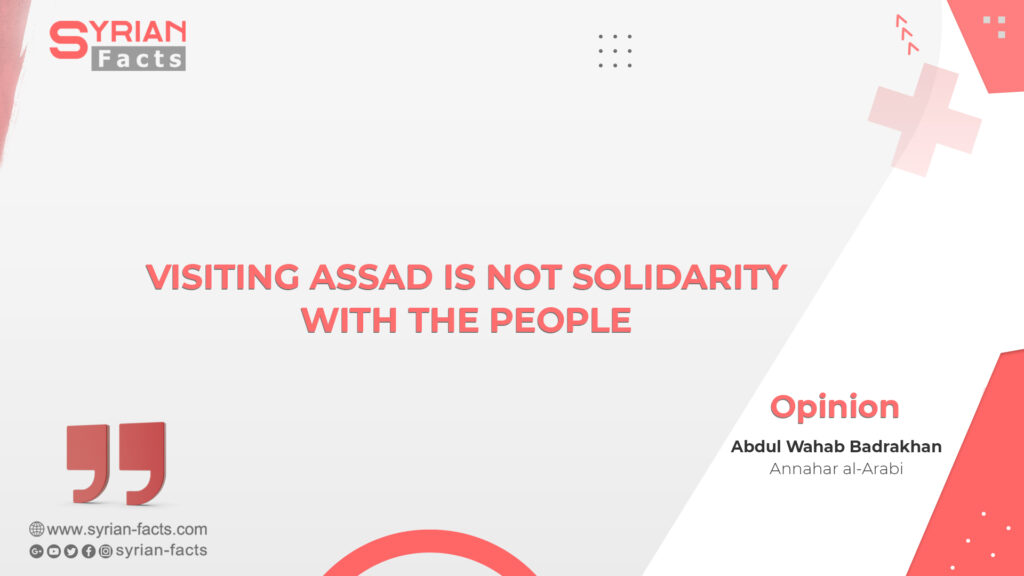Several Arab and international events, since 2011 in speciifc, have helped the Syrian regime and contributed to its survival. In every rapprochement, divergence, or crisis between the United States and Russia; every truce or engagement between the United States and Iran; every dispute between Russia and Turkey or between the latter and the United States; and all the plenty disputes between Arab countries Bashar al-Assad’s regime was there to anticipate certain interests or to reap benefits thereof. However, most importantly, in the darkest moments, since the beginning of Assad’s crisis until now, his survival in power received unwavering approval by Israel, which tried to spare him the repercussions of its war on Iranian interests, even though Israel would not hesitate sometimes to hit some of Assad’s sites of control when it would find that there were wings within the regime went too far in identifying with Iranians. This Israeli approval always means automatic American approval, albeit with some conditions.
There is no doubt that the decisive development that supported the survival of the regime was the emergence of “ISIS” at the moment when the armed opposition was advancing on the ground. It is no secret that the regime and its Iranian ally had a direct and evidenced contribution to the emergence of “ISIS” and letting it expand in parts of the Syrian and Iraqi territories, especially in terms of relying on ISIS to change the nature of the Syrian crisis from a people’s revolution against the regime to a state of terrorist extremism that is more dangerous than the “Al-Qaeda”. Later, ISIS became an open space for all kinds of interventions from Turkey and many other countries.
When the “Global Coalition Against Daesh” was formed, and its coordination with Damascus at some level, the regime considered that it had overcome the most difficult phase. Later, the other decisive development came through the Russian direct intervention “at an Iranian request,” followed by the Russian-Israeli coordination (to control the Iranian presence in Syria), backed by American-Israeli coordination. At the time, the dominant idea was that the continuation of the regime in power (despite all of its crimes and the use of the chemical weapons against its people) is “better” than seeing ISIS in power, or even another opposition-led regime whose aspects are not clear yet.
However, the international acquiescence to the de-facto comparison between the regime and ISIS did not go as far as rewarding Assad by rehabilitating and recognizing the regime. Rather, sanctions against him were intensified to push him to facilitate a political solution, that is, to address the core of the crisis between Assad and the Syrian people. The sanctions caused an economic crisis in Syria, which coincided with a similar crisis in Lebanon, and another one in Iran; all of which led the regime, along with the Iranian militias, to pursue drug trafficking, or what can be called the “Captagon war”, under the slogan of “breaking the siege”. But it does not seem to be working, and it will soon be confronted with US-Western tighter sanctions, according to plans being prepared now in Washington.
The unfortunate event of the earthquake, opened doors and windows for the ostracized, but “lucky” regime! The regime did not make any exceptional effort to help the afflicted people, not even in areas under its control, and did not see any reason to spend some of the money that it looted from the Syrian people. It rather politicized the catastrophe and employed it to repair the image of Assad and show his images with Arab visitors who are promoting forgiveness for Assad’s crimes and engaging in breaking its isolation, under the pretext of “solidarity with the Syrian people”. But, in reality, the message of visitors to Damascus, especially the Arab “parliamentarians”, was in solidarity with Assad, who turned half of the Syrian population, before the earthquake, into victims who are either killed, disabled, missing, detained, displaced and refugees.
Annahar al-Arabi





Be the first to write a comment.